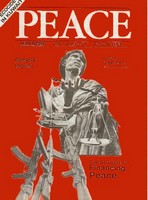
Peace Magazine Jul-Aug 1991, page 15. Some rights reserved.
Search for other articles by Janet Creery here
Search for other articles by Gideon Forman here
"What makes Canadians secure?" asks The Citizens' Inquiry into Peace and Security, the Canadian Peace Alliance's major Fall undertaking. Starting September 19 and running for six weeks, the Inquiry will visit some 20 communities coast to coast and in the far North inviting residents to explain their vision of peace and security in the present world.
In each community it visits, the Inquiry will hold hearings conducted by two of the project's five commissioners: Former Ambassador for Disarmament Douglas Roche, one-time Cabinet Minister Iona Campagnolo, Professor Jules Dufour, past president of the federal New Democratic Party Johanna den Hertog and native leader Konrad Sioui.
"Canada probably has the worst record of public debate and the least public openness of all the western industrial nations," says Johanna den Hertog. "All the other countries had major parliamentary debates before they committed their troops to the Gulf-not Canada," says den Hertog. She feels the Inquiry will create a much-needed discussion around defence policy.
Douglas Roche says "the end of the Cold War has brought a transformation movement to international relations. Canada must adopt a post-Cold War security policy that takes into account the new security threats that go beyond the East-West confrontations."
Representing Quebec on the Inquiry, Jules Dufour believes that "Canadians must learn to relate security with issues of environment, land rights and social justice." He adds: "The international context has changed. An era of cooperation and peace rather than competition is emerging. Let's see if we can develop new approaches."
Iona Campagnolo believes that the Inquiry is timely because "security has much broader implications than Canadians once imagined. Now we talk about security in terms of environmental security, security of world development, and other security options that must be re-explored to reflect the global society." The Inquiry, she adds, "will help us come to the realization that all of us are interconnected and interrelated."
Campagnolo is anxious to tackle issues arising from the Gulf war and Oka, among them the army's right to limit press freedoms and Canada's departure from the role of peace-keeper.
All are encouraged to make submissions to the Inquiry, and organizers are busy ensuring a wide range of participants.
Simon Rosenblum of Project Ploughshares and The United Nations Association's Joan Broughton stress that both peace movement and non-peace movement people must be involved. "We can't make this a loaded die," says Broughton. "The larger its perimeter the more likely the Inquiry is to be taken seriously."
When the tour is completed, the commissioners will write and publish a report based on the Inquiry's findings. Its projected release date-January, 1992-is designed to make it a force in the election likely to come next year. The report will be presented to Parliament and, it is hoped, point the way toward a more humane security policy.
For military planners, security always means the possession of bigger and better weapons. The Inquiry hopes to alter this thinking and examine security in other areas, particularly respect for human rights, protection of the natural world, healthy social services and decent levels of foreign aid. "Security is increasingly understood not as military power, but as the ability of our society to satisfy human needs on a sustainable basis," explains Bill Robinson of Project Ploughshares. And Marion Mathieson of the National Action Committee on the Status of Women adds: "Some women feel that all the armaments in the world cannot ensure that they are 'safe' even in their own homes..."
Activists say the new concept of security will not become established through the efforts of government but only through citizens' initiatives. "In the absence of leadership on the part of the government it becomes the responsibility of the peace movement to be a catalyst," says Simon Rosenblum.
For further information see the Calendar section (p.31) for local contacts or contact the National Coordinator Gideon Forman c/o The Canadian Peace Alliance 555 Bloor St. W., Toronto, Ontario Canada M5S 1Y6.
Phone (416) 588-5555; Fax (416) 588-5556.

Peace Magazine Jul-Aug 1991, page 15. Some rights reserved.
Search for other articles by Janet Creery here
Search for other articles by Gideon Forman here